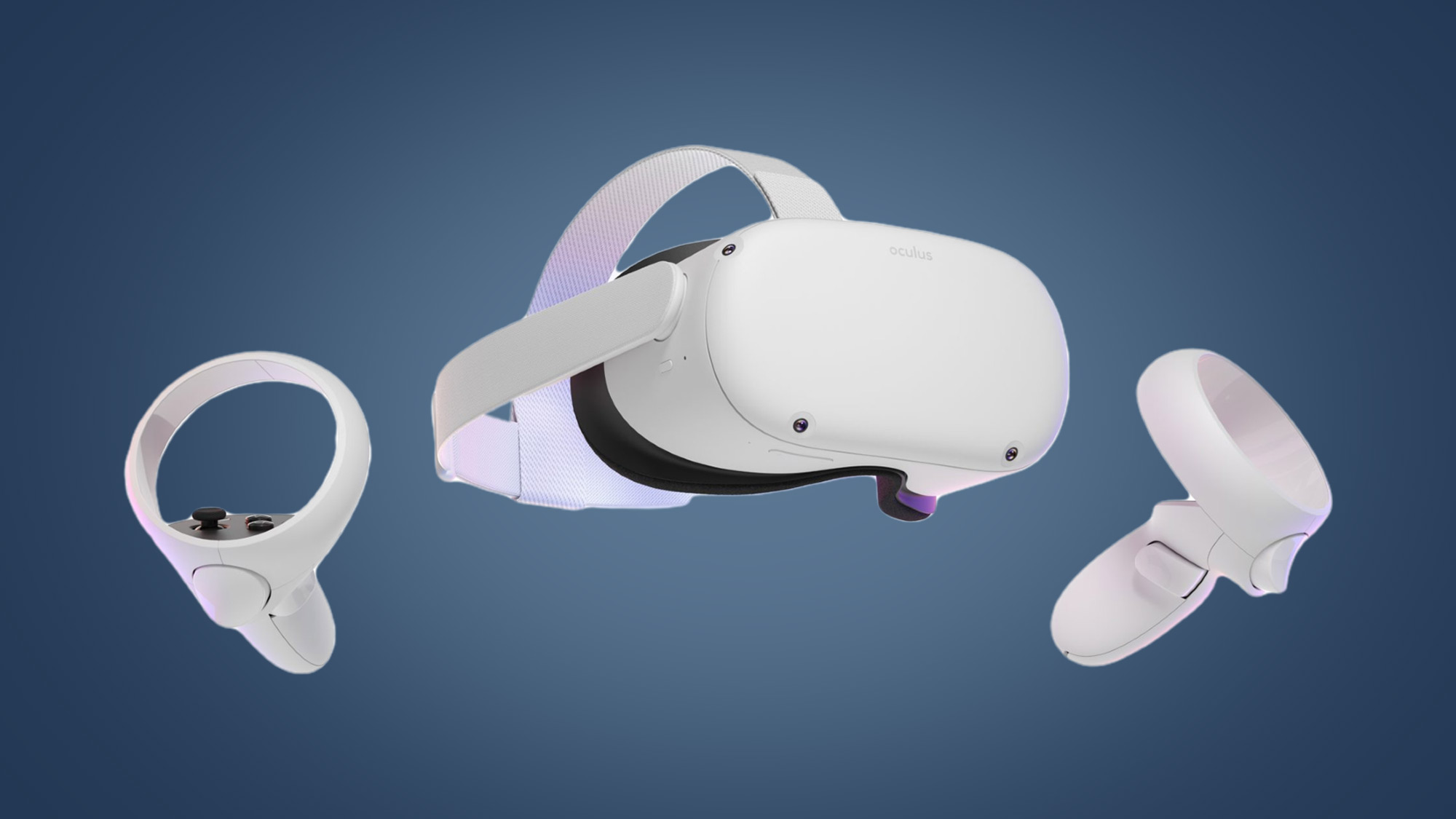
The Oculus Quest 3, which is now called Meta Quest 3, may not be on the cards to arrive for some time, but there's a good reason why people think it's on the way. While much has changed for Oculus, the announcement that Meta's working on an entirely different VR device has summoned a lot of speculation as to what it could offer the world of VR gaming.
Meta has clarified that development is still underway on the next generation of its more budget-friendly VR headsets, which spells good news for those worried that Meta Quest Pro might have condemned the Quest 3 to the grave.
At an earnings call for the company back in 2021, company CEO Mark Zuckerberg told investors that Meta has been working on "new hardware [that] will fit the same platform [as the Oculus Quest 2]" for some time. Importantly, we'll also likely see the Quest 3 drop under the Meta brand instead of Oculus.
We're not too happy about that decision, so for now, we'll keep using Oculus Quest 3 and Meta Quest 3 interchangeably as the former is more widespread among the gaming community. There's a lot of information to cover, though, so read on to find out all the latest news and speculation about the Oculus Quest 3.
Oculus Quest 3: what you need to know
- Oculus Quest 3 price: TBC. Meta CEO Mark Zuckerberg estimates between $300-500
- Oculus Quest 3 release date: TBC. Meta said it will launch “later next year” in October 2022, so October 2023 looks likely.
- Oculus Quest 3 specs: While there is some disagreement on the specifics, all the rumors point to a more powerful device with an improved display - and we expect to see more haptics added to the VR headset and its controllers.
- Oculus Quest 3 features: Meta has been working hard to develop its hand tracking and AR features for the Quest 2, so expect to see these get a boost on the Oculus Quest 3.
Oculus Quest 3 price
How much would an Oculus Quest 3 model cost? Well, the Oculus Quest 2 comes in two variants: a model with 128GB of storage priced at $400 / £400 / AU$630, and a 256GB version for $500 / £500 / AU$790. It would make sense for the follow-up VR headset to be sold for about as much as its predecessor, though we could see the Quest 3 cost a bit less than the Quest 2.
That's because the Oculus Quest 2 has been cheaper than it is right now; before Meta brought in a price increase (caused by inflation and production costs going up) the 128GB model cost £299 / $299 / AU$479, and the 256GB version sold for £399 / $399 / AU$639.
Speaking in a Stratechery interview, Meta CEO Mark Zuckerberg brought up Quest 3. While he wouldn't confirm a release window, he did advise it would be "in the price range of $300, $400, or $500, that zone." As a result, we could see Meta launch the Quest 3 at the Quest 2's cheaper price to make it more accessible (a strategy used with Quest 2, which had a lower launch price than the original Oculus Quest).
If you're worried that Meta having two headsets compete with each other might cause problems, fear not. Meta Quest Pro is clearly being marketed as a high-end device separately to Quest 3, costing $1,500 / £1,500 / AU$2,400. So, we'd expect Quest 3 to target the lower end so that Meta can appeal to both sides of the consumer scale.
Oculus Quest 3 release date
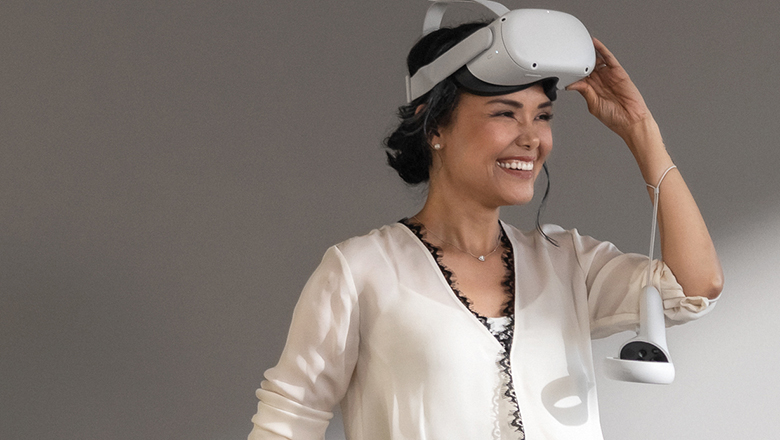
Considering the Quest Pro launched in October 2022, it shouldn't be too surprising to learn that Quest 3 isn't arriving soon. Launching them alongside one another could have resulted in the Quest 3 and Quest Pro cannibalizing each other's sales, after all. With Sony's PSVR 2 on the horizon, Meta will want to do everything it can to maintain its hold over the VR space.
However, we now know Quest 3's coming in 2023. During Meta’s Q3 2022 earnings call (reported by UploadVR), Meta CFO David Wehner mentioned Quest 3 while discussing increased costs in 2023:
“Conversely, our growth in cost of revenue is expected to accelerate, driven by infrastructure-related expenses and, to a lesser extent, Reality Labs hardware costs driven by the launch of our next generation of our consumer Quest headset later next year.”
With that information in mind, we'd go further to predict that the Quest 3 will drop in October 2023. This is based on the Quest 2 and Quest Pro's launch dates and would give it a nice head into the Christmas holiday season, which could set it up as the 'must-have' gadget of the year.
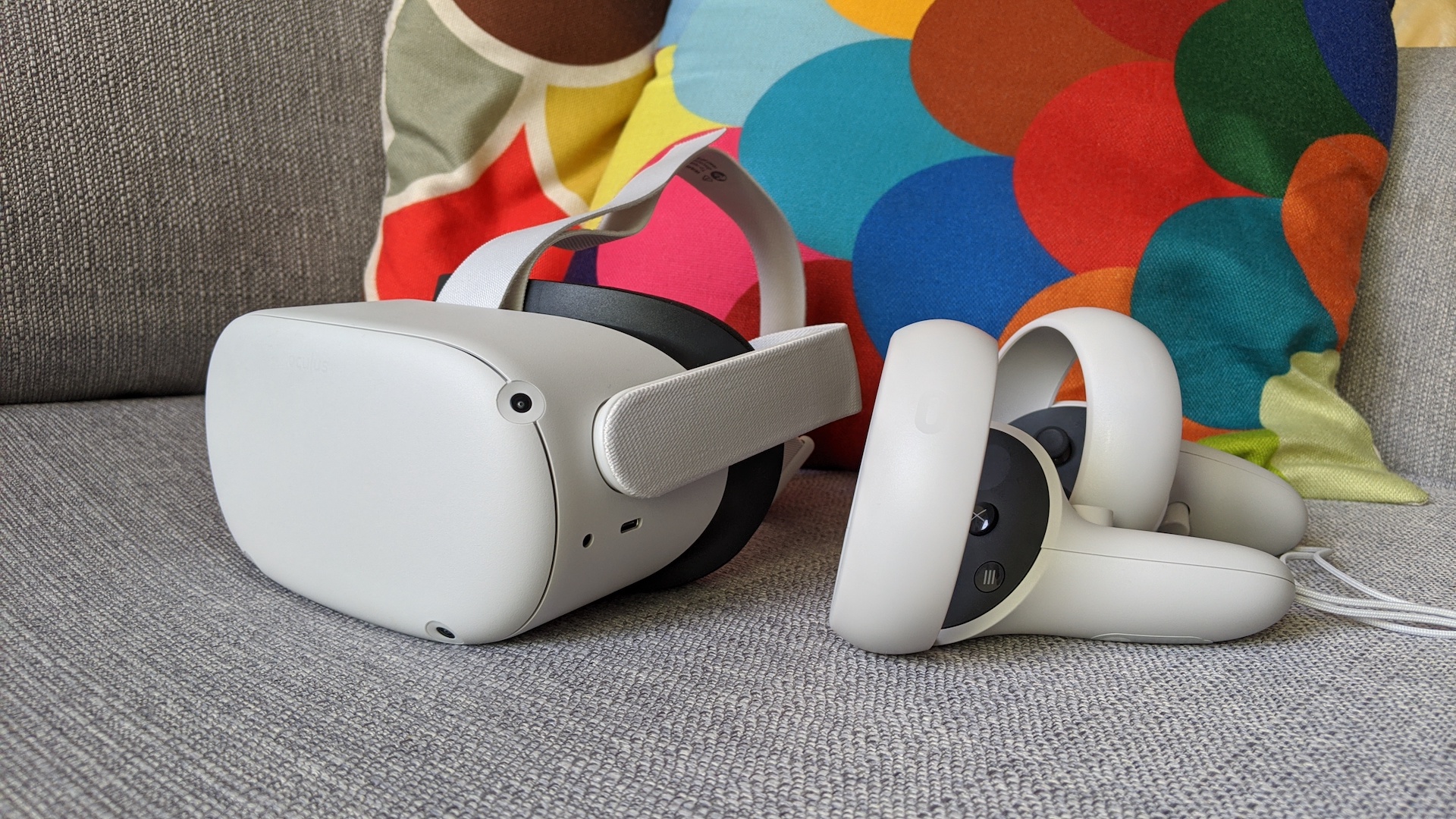
The Quest 3 likely isn't far away as it also looks like developer kits are getting into the hands of Quest app creators.
One Quest user on Reddit spotted that people can link three kinds of Quest headsets: the Quest 2, Quest Pro, and a third called "Eureka." While Eureka is not confirmed to be a Quest 3 developer kit specifically we do know it's some new model of Quest headset. As such it's most likely the Quest 3 unless Meta has some new kind of Quest headset up its sleeve.
Oculus Quest 3 specs and features
Given Meta's decision to drop its Oculus Rift line and go all-in on its standalone VR headsets - virtual reality devices that don't require an external PC or another piece of hardware - we would be stunned if the Quest 3 bucked the trend. As such, we can expect something nearly identical to the Quest 2, albeit with the customary improvements to battery life, processing power, and resolution.
The Quest 2 boasts a 50% sharper picture than the original device, which sets an impressive benchmark for the Quest 3 to follow. The Quest 2 also upped the refresh rate to 90Hz from the original Quest’s default 72Hz, and increased that figure again to 120Hz in 2021. As of September 2022, 120Hz support is no longer experimental.
It would follow, then, that the Quest 3 will come equipped with a minimum refresh rate of 90Hz. Time will tell whether upcoming VR titles can take full advantage of the upgrade, given that most games still don’t yet support that higher refresh rate.
However, thanks to leaker Brad Lynch, Oculus Quest 3’s design may have leaked alongside the specs. Revealing CAD images of the Meta Quest 3, codenamed Stinson, this seems to retain Quest 2's soft strap. It also appears to use pancake lenses like the Pro, an IPD wheel for separation adjustment, two side cameras for tracking, and four-cameras upfront with a depth sensor for mixed reality use. It's worth noting that even if they're real, these features could always change before launch.
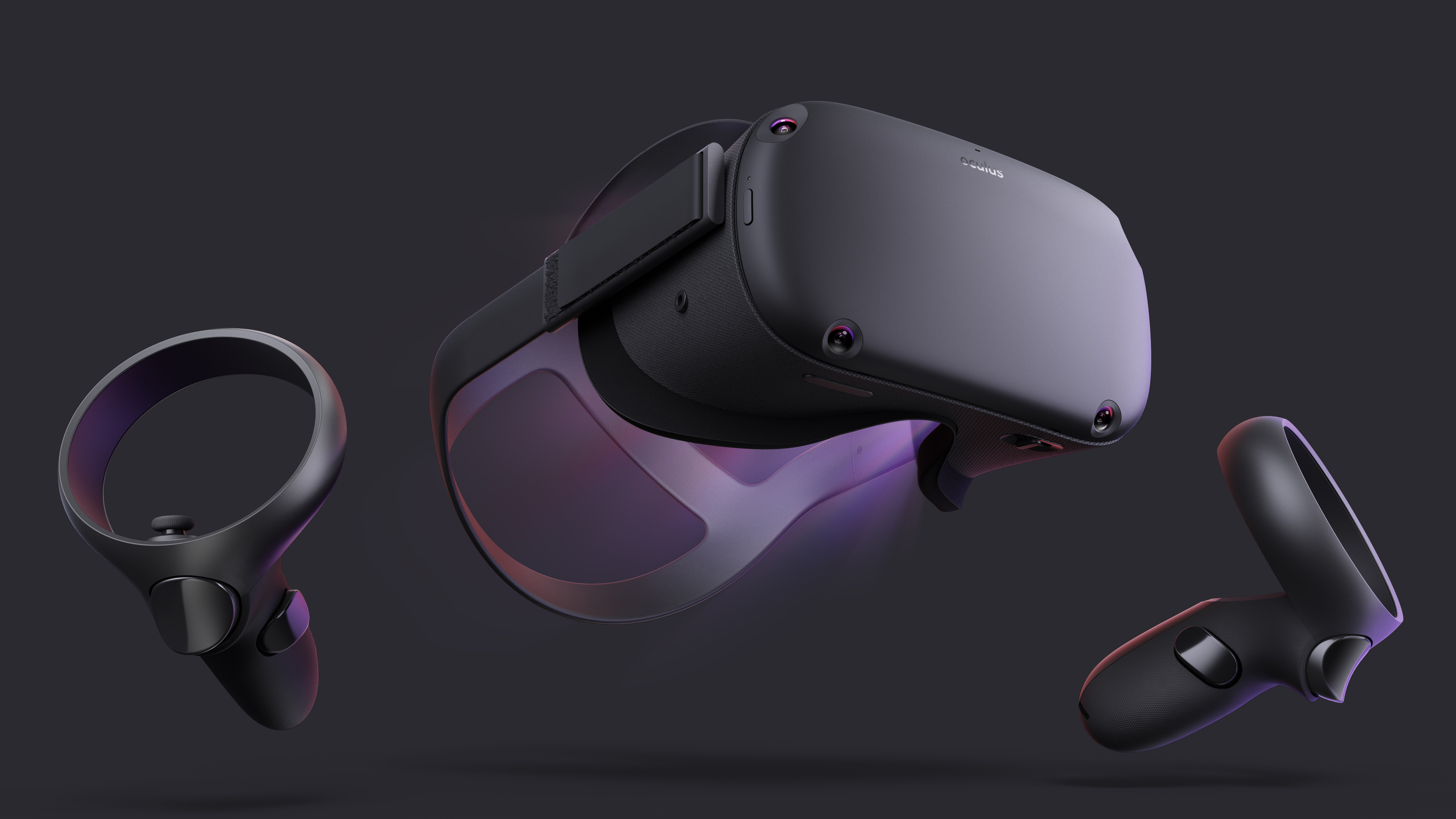
Otherwise, there are suggestions that the Quest 3 will adopt uOLED displays (an upgraded version of OLED). Though, we've also seen conflicting reports that instead hint at OLED displays, and mini LED displays. What they do at least agree on is some kind of visual enhancement will come to the Quest 3 - so expect improved display quality and higher resolutions.
We could also see changes to the devices form factor, possibly decreasing the headset's weight further or focusing on comfort-related alterations. While the Quest 3 may not be as impressive as Meta Quest Pro - we could still see it take some cues in terms of its design.
We'll also likely see new software that expands upon the Quest 2's AR and hand tracking features. Meta has been steadily improving its support for these functions via software updates - but we suspect it'll need to make some hardware tweaks to make them even more impressive.
For those that still enjoy using controllers, the kind of haptic feedback we're seeing in the PS5's DualSense controller could elevate VR experiences if it came to the Quest's pair of controllers in a meaningful way. While nothing is confirmed yet, we wouldn't be surprised if the Quest 3 started to include more haptics - we just hope Meta doesn't put haptics in the headset like PSVR 2.
Oculus Quest 3 predictions
In our Oculus Quest 2 review, it was hard to find fault with a VR headset that proved immersive, comfortable and easy to use. And yet, while it clearly leads the pack in the VR market, it still falls foul of some of the pitfalls that the technology as a whole suffers from. Here’s a list of updates we want to see on the Oculus Quest 3:
Improved motion sickness prevention
One of those technological pitfalls, and perhaps an unavoidable one, is the motion sickness that can often ensue when using any VR headset. Depending on your tolerance for whirring and blurring, the Quest 2 can be one helluva dizziness-inducer. While there isn’t yet a clear path to making any VR headset immune to user dizziness, it’s nonetheless something we’d like to see improved on the Oculus Quest 3.
A better fit
The same goes for the fit of the device. While the Quest 2 is indeed a comfortable weight when on the head, it can still be a little claustrophobic to achieve a good, tight fit. Again, it’s a problem encountered by almost all VR headsets, and a base-level issue that the next generation of hardware should at least attempt to better address. Those aforementioned design rumors suggest the new Oculus device could solve some of these issues.
Improved Oculus Store
Other improvements we’d like to see include a more effective in-VR Oculus Store. While the equivalent store on browser and in the app makes it easy to discover new releases and search for upcoming games, the store inside the headset itself seems to roll the dice on what apps are shown with no way to quickly navigate to new content. This makes it difficult to pre-order games and discover new titles to purchase when using the device, which is a pivotal part of ensuring the headset maintains replayability.
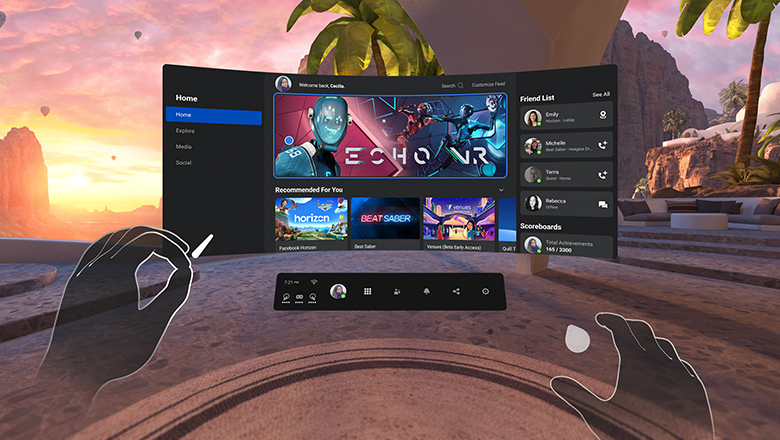
A neighborhood-like social space
While the Quest 2 has a competent party invitation system to get you game-to-game with your friends, there isn’t a social space to engage with others in-between. It would be interesting to see the Quest 3 introduce a virtual social space, in the same vein as NBA 2K’s neighborhood area, to share some downtime with others. What’s with the multi-person furniture in the current home environment if there’s nobody to share it with? Luckily, Meta's new metaverse project – ambitious as it seems – suggests virtual social spaces will be at the forefront of all future Quest headsets.
Improved media sharing
Sharing screenshots and videos on Oculus devices has never been easy, and it’s an issue that the Quest 2 has tried to address with a few video updates. The process could still be more streamlined, so we'd like to see the Oculus 3 make the whole deal more accessible.1080p video, app integration, proper audio syncing – that’d all be golden.







